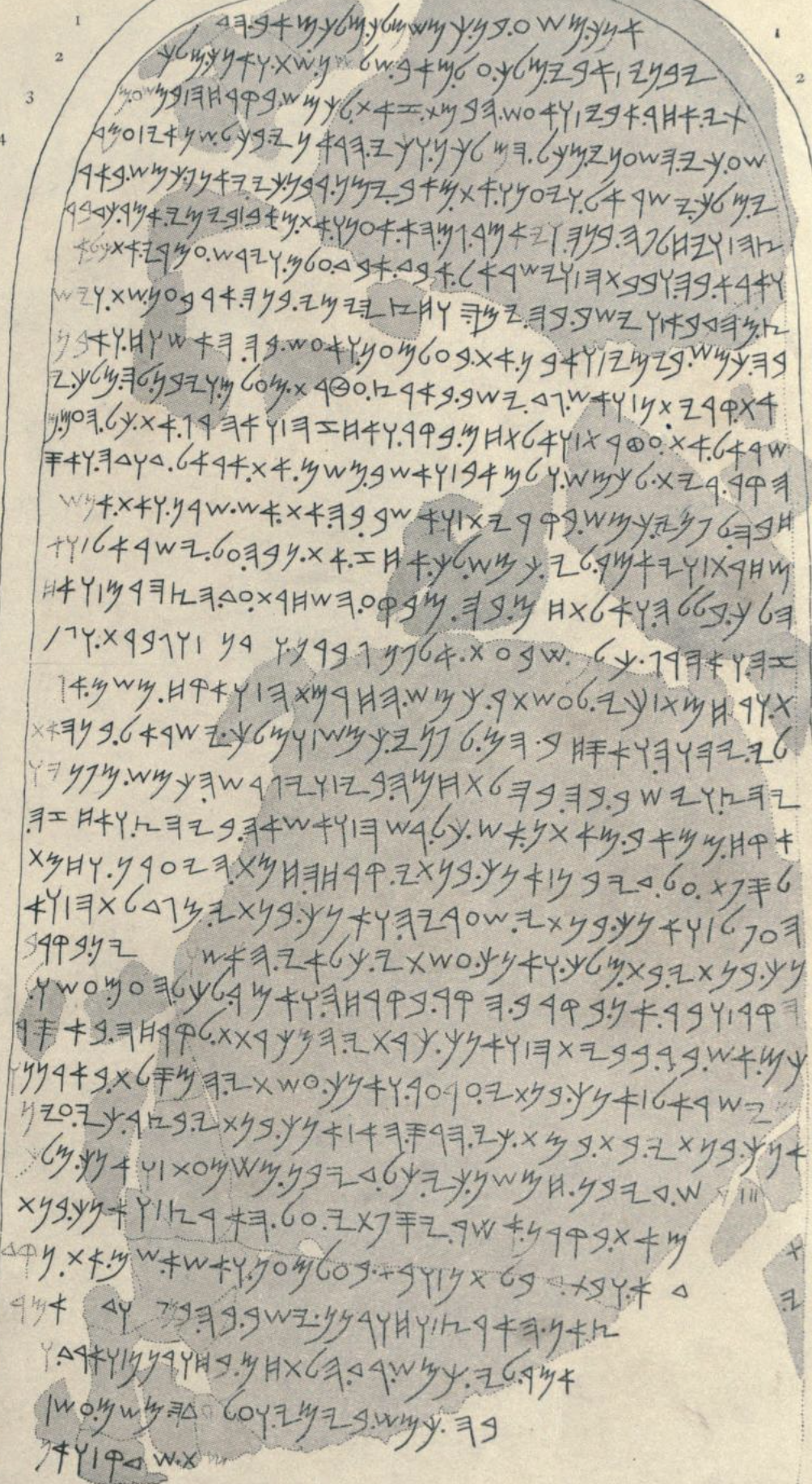About the Poem
Erection of a sanctuary at the city of Dibon, modern Dhiban, prompted the inscribing of this Moabite poem. The portion treated below concerns the Israelite colonization of Moab. The latter’s king Mesha is presented as the speaker of the text. Notice how the vanquished are massacred in honor of the national god Chemosh (“And I seized it and killed everybody of it . . . because I had dedicated it to Ashtar-Chemosh”). That sort of ban is familiar from the context of holy war in the Bibles of Judaism and Christianity.
| Moabite | English |
| `omriy melek yisra’el wayyi`anniw ‘et mo’ab yamin rabbin kiy yi’nap kamosh ba’artsoh |
wayyachlopehu benoh wayyo’mir gam hu’ ‘a`anniw ‘et mo’ab |
| biyamay ‘amar ken |
| wa’er’ boh wabibetoh |
| wayisra’el ‘abod ‘abad `olam wayarash `omriy ‘et kol ‘erets mahedaba’ |
| wayyeshib bah yamehu wachetsiy yamey benoh ‘arba`in shat wayyashibeha kamosh biyamay |
| wa’iben ‘et ba`alme`on wa’a`as bah ha’ishwach wa’iben ‘et qiryaten |
| wa’ish gad yashab ba’erets `atarot mi`olam wayyiben loh melek yisra’el ‘et `atarot |
| wa’iltachim baqqir wa’ochazeha |
wa’ehrog ‘et kol ha`am mihaqqir riyyat likamosh walimo’ab |
| wa’ashib misham ‘et ‘ari’el dawdah wa’eschabeha lipney kamosh biqariyot |
| wa’osheb bah ‘et ‘ish sharon wa’et ‘ish macharit |
| wayyo’mir liy kamosh lek ‘echoz ‘et neboh `al yisra’el |
| wa’ahlok bilelah wa’iltachim bah mibaqi` hashshachrit `ad hatstsuhrem |
wa’ochazeha wa’ehrog kullah shib`at ‘alapin gabarin wagerin |
| wagabarot wagerot warachamot |
| kiy la`ashtar kamosh hachramtiha |
| wa’eqqach misham ‘et keley yahweh wa’eschab himmo lipney kamosh |
wamelek yisra’el banah ‘et yahats wayyeshib bah bihiltachimoh biy |
| wayyigarishehu kamosh mipney |
| wa’eqqach mimo’ab ma’ten ‘ish kol roshoh |
| wa’issa’ehu biyahats wa’ochazeha lispot `al daybon |
| Omri was the king of Israel, and he oppressed Moab many days because Chemosh was angry with his land. |
| Then his son succeeded him, and he too said: “I will oppress Moab!” |
| In my days he said so. |
| But I gloated over him and over his house, |
| while Israel was utterly destroyed forever. Now Omri had occupied all the land of Medeba |
| and dwelt in it his days and half the days of his son, forty years. But Chemosh restored it in my days. |
| Then I built Baal-meon and made the reservoir in it, and I built Kiriathaim. |
| Now the men of Gad had dwelt in the land of Ataroth from eternity, and the king of Israel built Ataroth for himself. |
| But I fought against the city and seized it |
| and killed all the people from the city–a satiation for Chemosh and Moab. |
| Then I brought back from there the altar-hearth of its beloved and dragged it before Chemosh in Kerioth. |
| And I settled the men of Sharon and the men of Maharit in it. |
| Next Chemosh said to me: “Go, seize Nebo from Israel!” |
| Thus I went at night and fought against it from the break of dawn until noon. |
| And I seized it and killed everybody of it–seven thousand male citizens and aliens, |
| and female citizens and aliens, and slave women– |
| because I had dedicated it to Ashtar-Chemosh. |
| Then I took the vessels of Yahweh from there and dragged them before Chemosh. |
| Now the king of Israel had built Jahaz and dwelt in it when he fought against me. |
| But Chemosh drove him out before me. |
| I took two hundred men from Moab, its entire unit, |
| and brought it against Jahaz and seized it to annex to Dibon. |
Listen to the Poem in Moabite
Read by Edwin Hostetter
Listen to the Poem in English
Read by Michael Cai
Historical Information
The poem was discovered in Dhiban and dates to the second half of the ninth century BCE, after Moab rebelled against Israel. The text is inscribed on a black basalt stone, measuring slightly over one meter tall and roughly two-thirds of a meter across. The Moabite script used is the same as Hebrew writing of the time. Here the words are separated by dots, and the sentences are separated by vertical strokes–as can be seen in the accompanying photograph and handcopy.


Sources
***transliterated (with vocalization) and translated by the curator***
Curated by Edwin Hostetter, Department of Religion, George Washington University
